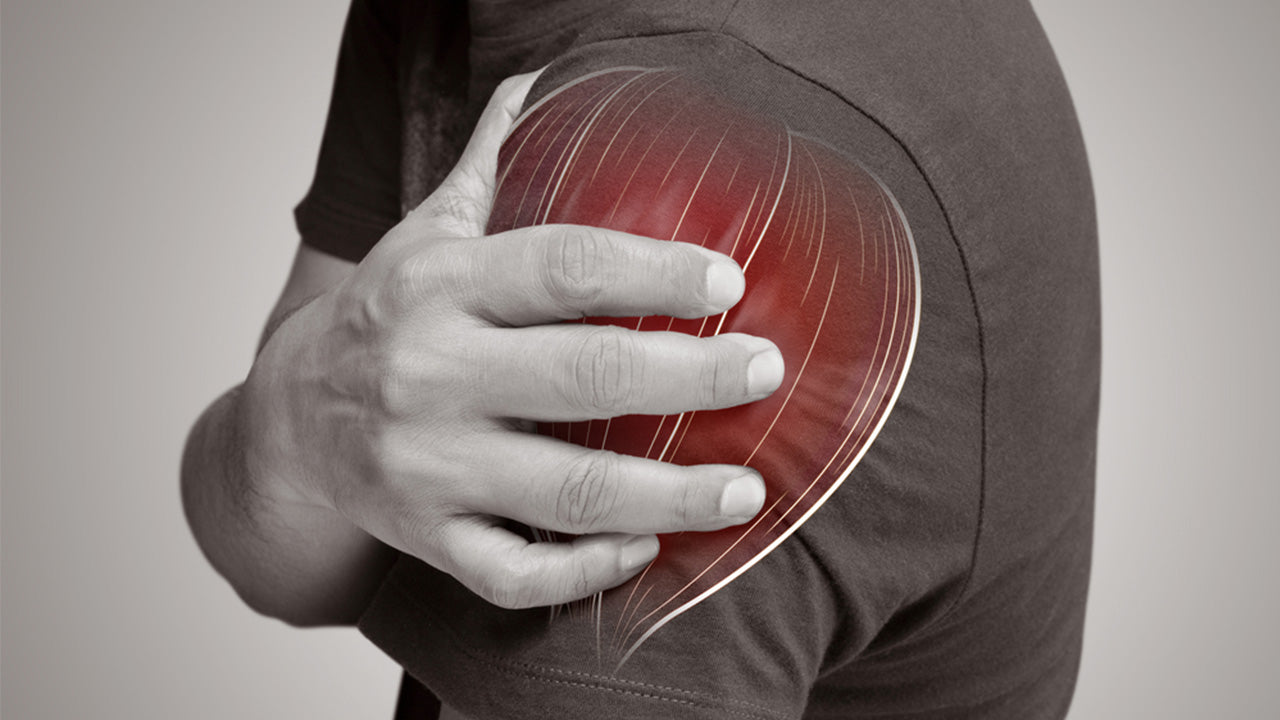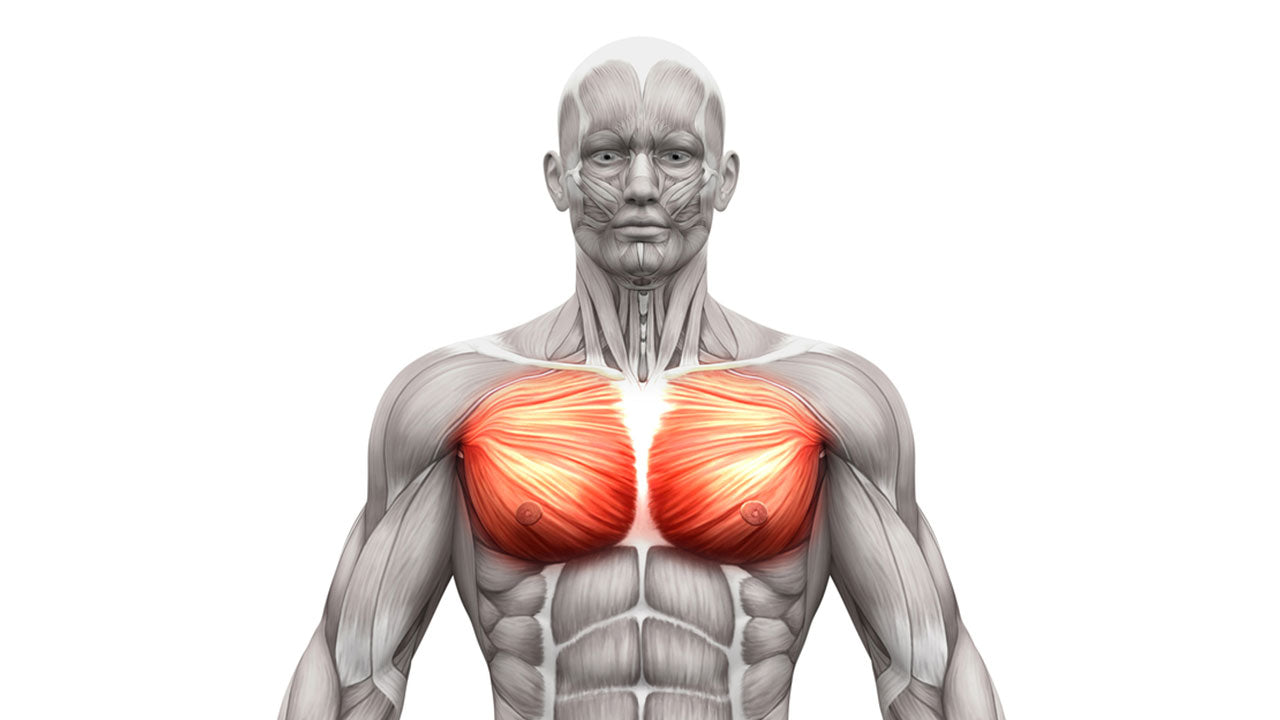The Top 10 Nutrients and Vitamins for Muscle Recovery
 By: by Amino Science
By: by Amino Science

If you're looking to build muscle, you'll have to master the balancing act between muscle protein breakdown and buildup, and that requires leaving time and space for muscle recovery. Vigorous exercise causes microtears and normal muscle damage that is then repaired by the body. This process makes your muscles stronger and tells your body that more muscle is needed. You can support muscle function and reduce the time spent with sore muscles during this post-workout window, so long as you have the proper nutrient support for rebuilding. So what are the best nutrients and vitamins for muscle recovery? We have the top 10 contenders.
How Muscles Are Built
Muscle recovery is an intrinsic part of building new muscle. It doesn't just start in the gym either: it has one foot planted firmly in your kitchen. Your body needs proper nutrition and hydration to perform well at the gym, and then it needs the same again to clear out the cellular debris caused by workouts and build anew.
The average American diet is made up of more than 70% processed food, but even an extremely healthy diet may fall short if you're pushing yourself to bulk up. Likewise, a general multivitamin may not do the trick either: if you're working up to your body's limit and striving to reach past it, you need more than average support. The CDC estimates that the general population has iron, vitamin D, and vitamin B6 deficiencies, and these deficiencies are more keenly felt by those who work their bodies to the max.
Outside of the whole grains, dietary fats, and protein you get from your food, what else is needed to promote strength and achieve lean muscle growth?

The Top 10 Nutrients and Vitamins for Muscle Recovery
Sports nutrition prioritizes high amounts of protein in the diet for those seeking to build strength and muscle mass. That is because protein contains the building blocks of muscle, the essential amino acids needed to synthesize all new muscle. What other nutrients do you need to consume to get the most out of your workout in the recovery window? Here are the top vitamins for muscle recovery.
1. Vitamin A
Vitamin A plays an important role in protein synthesis, and so, along with being important for eye health and serving as an antioxidant against the damage of free radicals, it's also a key vitamin for muscle growth. Vitamin A contributes to workout strength thanks to its role in the creation of glycogen, the stored form of glucose energy (from sugar) that provides you the rapid strength needed for more reps, for sports like sprinting, and most certainly for weightlifting. Vitamin A is essential for bone health too, which walks hand-in-hand with muscle strength, but due to factors like diets low in fats, alcohol use and abuse, and diabetes, many people are deficient in vitamin A.
To get more natural vitamin A from your diet, look towards carrots, fatty fish like salmon, and eggs.
2. Vitamin B3
Vitamin B3 (which also goes by the name niacin) supports muscle-building efforts by cleaning up your cholesterol ratio (promoting "good" HDL numbers while reducing "bad" LDL levels) and supporting the production of necessary hormones.
Vitamin B3 can be had by consuming animal foods like meat, fish, and eggs, and by eating plant foods like seeds and bananas.
3. Vitamin B6
Vitamin B6, another B-complex vitamin, targets circulation and heart health by boosting red blood cell production and maintaining the necessary level of nitric oxide in the blood, which relaxes our blood vessels and allows our blood to flow freely.
Found naturally in foods like fatty fish, bananas, and chickpeas, vitamin B6 is also well represented in vitamins and supplements, so you may just find a hefty dose in your multivitamin of choice.
4. Vitamin B9
Vitamin B9, otherwise known as folate or folic acid (the synthetic version of folate), is important in human development from the womb to the tomb. It's important as a prenatal vitamin for pregnant women, and it remains important throughout our lives for energy production, muscle tissue repair, and new muscle cell creation.
Vitamin B9 is found in foods like spinach and avocado, a healthy fat. It's widely prevalent in multivitamin formulas and protein powders made for workout recovery, muscle repair, and more.
5. Vitamin B12
The last of the impressive family of B vitamins on this list, vitamin B12 works closely with folate for muscle repair and is essential for producing the red blood cells needed to deliver oxygen to our muscles.
Vitamin B12 is found in animal foods like meat, dairy, poultry, and fish, and vegans and vegetarians may suffer from a B12 deficiency due to their reliance on plant-based foods. For those who don't eat meat, soy products, nut milks, and fortified cereals have some vitamin B12, and supplementation with B12 is often recommended to shore up any gaps.
6. Vitamin C
Vitamin C is well known as the cold- and flu-battling antioxidant, but did you know it helps with muscle recovery too? Thanks to its anti-inflammatory properties, vitamin C both supports your immune system and reduces the lactic acid buildup in your muscles after a workout (the main culprit for muscle soreness). Vitamin C also boosts collagen production, which is needed for skin and connective tissue health and repair.
Food sources of vitamin C don't stop at citrus fruits like oranges. You can also find high levels of vitamin C in leafy greens like kale, which is known as a superfood thanks to its abundance of vital nutrients.
7. Vitamin D
We can synthesize vitamin D from the sunshine we soak up through our skin, but vitamin D deficiency is nevertheless all too common, in part due to lifestyle necessities like working inside, but also due to circumstances outside of our control, like the melanin content of our skin, or even where we live. There are fewer hours of sunlight during the winter months, and those living in more northern locales may deal with a lack of sufficient vitamin D-rich sun throughout the year.
Vitamin D is critical for helping us absorb calcium, making it important for bone strength and dozens of other processes like insulin reaction, mood balance, and muscle protein synthesis.
Vitamin D foods include fatty fish, dairy products such as cheese and yogurt, beef liver, soy milk, and mushrooms if they're left to soak up sunlight before you consume them. To optimize the effectiveness of vitamin D, make sure you also get enough vitamin K (found in dark, leafy green vegetables). If your vitamin D levels are low, sun exposure, as well as supplementation, is recommended.
8. Vitamin E
Vitamin E is known for encouraging skin tightening and suppleness, slowing down signs of aging, and helping to guard against free radical damage. Working out and vigorous physical activity creates oxidative stress in our bodies that needs to be met with antioxidant aid from nutrients like vitamin E.
Vitamin E can be found naturally in nuts, seeds, spinach, avocado, and fish such as rainbow trout. In addition to antioxidant support, vitamin E also helps flush out toxins and cellular waste, which is why it's part of our recommended liver flush diet.
9. Omega-3 Fatty Acids
If you eat a standard American diet, you're likely to have a skewed omega-3-to-omega-6 fatty acid ratio. The ideal is as close as possible to a 1:1 ratio, but due to the overabundance of omega-6s (thanks in part to vegetable oils in processed foods and the difficulty and cost associated with eating natural omega-3 foods), many first-world residents have around a 20:1 ratio when it comes to omega-6 and omega-3 fatty acids. We can optimize this ratio by eating more omega-3s.
Omega-3s are needed to help reduce post-workout muscle soreness and promote muscle growth (not to mention skin, brain, joint, eye, and cardiovascular health).
Omega-3 fatty acids are found in the highest concentrations in fatty, oily fish like sardines, tuna, and mackerel, but they can also be found in eggs, nuts like walnuts, avocados, or fish oil supplements.
10. Amino Acids
There is no rebuilding muscle without a proper amount of all nine essential amino acids. Many workout aids and protein powders focus on the branched-chain amino acids (BCAAs), but they are only one-third of the full host of necessary aminos for muscle recovery and new muscle growth. If your body has to repair your muscles without a sufficient supply of amino acids, it will catabolize nearby muscle cells for these molecules, which is like building an addition on your house using supplies you have to rip out of the walls already built.
Amino acid foods include "complete protein" foods, such as quinoa, animal meats, and eggs, and complementary proteins like beans and lentils that almost contain all nine amino acids, but still need to be combined with another food like a whole grain for the rest. When actively building muscle, it's important to keep your essential amino acid levels at max capacity at all times, which is where amino acid supplementation comes in handy.
Supplementing for Muscle Recovery
We here at AminoCo have an amino acid formula that combines a scientifically balanced amount of all nine essential amino acids, with protein support from creatine and with the inclusion of vitamins needed to reduce muscle cramps and aid workout performance. Discover more here.
On top of a whole foods diet that contains lean protein and nutritionally dense plant foods, make sure you're getting the best vitamins and amino acid support for your post-workout muscle recovery.

Up to 25% off Amino
Shop NowTAGS: exercise
Join the Community
Comments (0)
Most Craveable Recipes




 833-264-6620
833-264-6620



















